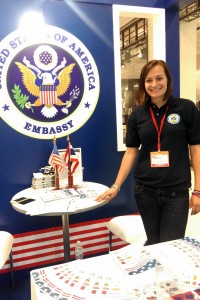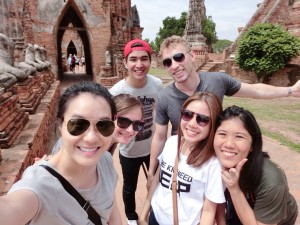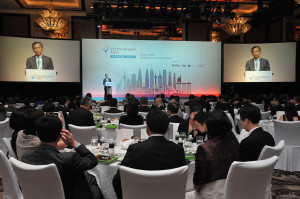
As a joint MAIR/ECON student, Julianne Dunn continues to learn about U.S. economic interests in the world while interning at the United States Department of State in Washington, DC.
If you’re anything like I was, you might be trudging through your first year at Maxwell with a vague idea of the topics you’re interested in and might want to work on. When someone asked me what I was planning to do after graduation, I answered something along the lines of “I want to work on international trade policy in Southeast Asia.” I had very little idea what that actually meant, who I might be working for, or what I might actually do all day for the rest of my life. I spent a lot of time hoping no one asked. After taking on a summer internship and independent research project in Bangkok, Thailand, I not only have a clear idea of the career I want to pursue, but I even learned some skills that are helping me get there.
Through an internship at the U.S. Foreign Commercial Service (FCS) office, I was able to see what working in international trade actually looked like. With offices at embassies around the world, FCS seeks to represent U.S. business interests abroad. This includes helping small businesses export to new markets, and conducting “commercial diplomacy” to ease regulations and facilitate trade for U.S. companies. Through preparing briefs on particular market segments in Thailand for U.S. businesses wishing to export, compiling and editing the annual Country Commercial Guide, and researching and writing a proposal to open a new FCS office in Cambodia, I learned about the challenges facing U.S. companies while honing my professional research and communication skills. In addition, I worked with many of the local staff members to promote U.S. products and companies on social media. At embassy events, including receptions at the Ambassador’s residence, I was able to network with embassy staff, Foreign Service officers, and American and Thai business people. These interactions allowed me to better understand what living and doing business in Southeast Asia was really like.
The local staff and other American and Thai interns turned a good professional experience into a great personally fulfilling one. Through everyday interactions I learned about working with people in a different culture and how to adjust my communication away from the forward, often abrupt style that we use in the U.S. But my coworkers also became fast friends who taught me about their food, culture, and language. We took weekend trips together and exchanged cultural anecdotes. These interactions were fun, but also helped me along my path toward becoming a global citizen.
While I was in Thailand I also had the opportunity to work on an independent research project studying foreign direct investment in Cambodia, something that had just piqued my interest in my spring coursework at Maxwell. Working on the proposal for FCS allowed me to gain new perspectives and allowed me to connect with people who are working with foreign direct investors in Cambodia. I was even able to meet with some of these people in person during a trip to Phnom Penh. These experiences shifted my professional focus and helped me to redefine the direction I’d like to go after graduation.
There’s a huge pressure to intern somewhere you know you want to work after graduation. After all, internships often turn into jobs, right? But what if you don’t really know where you want to work after graduation? I certainly didn’t, but starting an internship in the region and field I was interested in couldn’t have been more helpful in setting me on the path toward my future. Ultimately, I’ve decided that working for the U.S. government on international trade policy isn’t for me. But sometimes learning what you don’t want is even more important than learning what you do want. Along the way, you might even pick up some new friends, professional contacts, and skills. The only way to find out is to jump right in.



